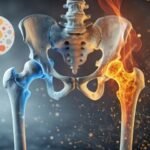Arthritis is a joint disorder causing inflammation. Osteoarthritis, rheumatoid arthritis, and gout are some of the problems that can be caused due to arthritis. It affects mostly people starting from age between 40 years to 60 years.
Dr. Mahanta, a reputed orthopedic specialist in Dwarka, Delhi, explained arthritis, its types, causes, symptoms and treatment in this detailed guide.
What is Arthritis?
Arthritis is a condition that leads to joint damage, affecting areas in body where two bones connect. As you grow older, joints can naturally undergo wear and tear. It develops in individuals as a result of this natural lifelong process. Additionally, certain forms of arthritis can be triggered by injuries that cause joint damage.
Types of Arthritis:
There are following types of arthritis as per Dr. Mahanta
- Osteoarthritis (OA): The most common form, OA is the result of wear and tear on joints over time. It is a chronic joint condition where the protective cartilage that cushions the ends of your bones wears down over time. This can lead to pain, swelling, and decreased joint mobility.
- Gout: Gout is caused by the accumulation of uric acid crystals in the joints, leading to intense pain and inflammation.
- Rheumatoid Arthritis (RA): Unlike OA, RA is an autoimmune disorder where the immune system damages the joints. RA is when your body’s defense system mistakenly attacks your joints, causing them to swell, ache, and sometimes deform. It’s like your body throwing a tantrum at the joints, making them feel all inflamed and uncomfortable.
- Psoriatic arthritis: It is related to a skin disorder called psoriasis, causing joint stiffness, skin rash and affect fingernails and toenails.
- Ankylosing spondylitis: This type causes lower back pain. Spine vertebrae fuse and become rigid.
- Juvenile Idiopathic Arthritis (JIA): JIA stands out as a form of arthritis in children.
What are the main causes?
The major causes of this joint disease are mentioned below:
- Ageing: Osteoarthritis is caused with age.
- Joint Injuries: Can lead to osteoarthritis over time.
- Genetics: A family history increase the risk.
- Autoimmune Response: In RA, the immune system attacks the joints.
- Uric Acid Buildup: Gout is caused by crystals forming in the joints due to excessive uric acid.
- Infections: Bacterial or viral infections cause infectious arthritis.
- Underlying Conditions: Diseases like lupus or psoriasis leads to arthritis.
Symptoms of arthritis
It starts with signals that escalate over time. Joint pain, stiffness, swelling, and decreased range of motion are common indicators. Dr. Mahanta listed the following symptoms of this joint disease:
- Joint Pain: Aching or discomfort in one or more joints.
- Swelling: Joints may appear larger or feel tender.
- Stiffness: Difficulty moving a joint, especially in the morning or after periods of inactivity.
- Redness and Warmth: Inflamed joints get warm and appear red.
- Decreased Range of Motion: Difficulty moving joints as freely as before.
- Fatigue: Feeling tired is linked to the body’s response to inflammation.
- Weakness: Muscles around affected joints may feel weaker.
- Joint Deformities: In severe cases, joints may change shape.
- Fever: In some cases, like rheumatoid arthritis, fever is experiened as a symptom.
- Tenderness: Joints may be sensitive to touch.
Arthritis Treatment in Dwarka
Dr Mahanta at The Bone Clinic in Dwarka, Delhi is sharing the treatment options available in Delhi at his clinic:
- Medicines: Over-the-counter options like acetaminophen or prescription opioids for severe pain. Reduce pain and inflammation (ibuprofen, naproxen). Antirheumatic Drugs for autoimmune types like rheumatoid arthritis, slow the progression of the disease.
- Exercise: Regular, low-impact activities to maintain joint flexibility and strengthen muscles. Especially for osteoarthritis, as excess weight adds stress to weight-bearing joints. He designs customized exercise programs to improve joint function and reduce pain. He also prescribes canes, braces, or splints to support and protect joints.
- Injections: Corticosteroids are injected directly into the joint to reduce inflammation and Hyaluronic Acid lubricates and cushions the joint, used for knee arthritis.
Arthritis surgery in Dwarka, Delhi
In severe cases, surgery is needed. There are following types of arthritis surgery available.
Joint replacement in Dwarka
Joint Replacement surgery is a surgery performed in two ways:
- Total Joint Replacement: A common surgery for hips and knees, involves replacing the entire joint with a prosthetic one.
- Partial Joint Replacement (Arthroplasty): Preserving more of the natural joint, this method targets specific areas affected by this joint disease.
Joint Fusion (Arthrodesis) surgery
This procedure involves fusing the bones around the joint, in smaller joints like the ankle, to eliminate pain.
Joint Resurfacing surgery
Instead of replacing the entire joint, in this surgery removing and replacing only the damaged surface is done.
Osteotomy surgery
By removing or adding a wedge of bone, osteotomy redistributes weight, shifting it away from damaged areas, applied to correct deformities and alleviate pain.
Synovectomy surgery
Performed in the early stages of RA, this procedure entails removing the synovium (joint lining) to reduce inflammation and preserve joint function.
The problem of arthritis is not something to stress much, it is more like a natural disorder that comes with age if not due to any injury or trauma. Dr Mahanta, arthritis specialist doctor in Dwarka says a healthy lifestyle is capable enough to prevent the risks




